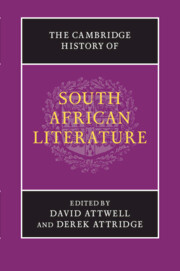Book contents
- Frontmatter
- Introduction
- PART I ORATURES, ORAL HISTORIES, ORIGINS
- PART II EXPLORATION, EARLY MODERNITY AND ENLIGHTENMENT AT THE CAPE, 1488–1820
- PART III EMPIRE, RESISTANCE AND NATIONAL BEGINNINGS, 1820–1910
- PART IV MODERNISM AND TRANSNATIONAL CULTURE, 1910–1948
- PART V APARTHEID AND ITS AFTERMATH, 1948 TO THE PRESENT
- 19 The fabulous fifties: short fiction in English
- 20 Writing in exile
- 21 Afrikaans literature, 1948–1976
- 22 Afrikaans literature after 1976: resistances and repositionings
- 23 The liberal tradition in fiction
- 24 Black Consciousness poetry: writing against apartheid
- 25 Popular forms and the United Democratic Front
- 26 Writing the prison
- 27 Theatre: regulation, resistance and recovery
- 28 The lyric poem during and after apartheid
- 29 Writing and publishing in African languages since 1948
- 30 Writing the interregnum: literature and the demise of apartheid
- 31 Rewriting the nation
- 32 Writing the city after apartheid
- PART VI SOUTH AFRICAN LITERATURE: CONTINUITIES AND CONTRASTS
- Index
- References
28 - The lyric poem during and after apartheid
from PART V - APARTHEID AND ITS AFTERMATH, 1948 TO THE PRESENT
Published online by Cambridge University Press: 28 January 2012
- Frontmatter
- Introduction
- PART I ORATURES, ORAL HISTORIES, ORIGINS
- PART II EXPLORATION, EARLY MODERNITY AND ENLIGHTENMENT AT THE CAPE, 1488–1820
- PART III EMPIRE, RESISTANCE AND NATIONAL BEGINNINGS, 1820–1910
- PART IV MODERNISM AND TRANSNATIONAL CULTURE, 1910–1948
- PART V APARTHEID AND ITS AFTERMATH, 1948 TO THE PRESENT
- 19 The fabulous fifties: short fiction in English
- 20 Writing in exile
- 21 Afrikaans literature, 1948–1976
- 22 Afrikaans literature after 1976: resistances and repositionings
- 23 The liberal tradition in fiction
- 24 Black Consciousness poetry: writing against apartheid
- 25 Popular forms and the United Democratic Front
- 26 Writing the prison
- 27 Theatre: regulation, resistance and recovery
- 28 The lyric poem during and after apartheid
- 29 Writing and publishing in African languages since 1948
- 30 Writing the interregnum: literature and the demise of apartheid
- 31 Rewriting the nation
- 32 Writing the city after apartheid
- PART VI SOUTH AFRICAN LITERATURE: CONTINUITIES AND CONTRASTS
- Index
- References
Summary
Poetics and politics of the lyric poem
Distinguished by the expression of personal observations and feelings, the lyric poem is an introspective and self-reflexive form that seeks to give direct voice to individual consciousness, articulating its singular patterns of cognitions, desires and doubts. This self-expressive impulse is closely associated with Romanticism, and specifically with the Romantic projection of the internal life of a subject who is estranged from existing political institutions and social structures, turns to nature and natural philosophy for alternative systems of meaning and value, and takes this subjective revolt as the very material of poetry, striving, against the limits of language itself, for spontaneous and sincere utterance. For all their conceptual and stylistic differences, Wordsworth's ‘Tintern Abbey’ and Shelley's ‘Adonais’ have in common the self-expressive impulse of a subject who seeks in nature an aesthetic understanding of the mind's symbolic relation with the real.
Whilst Romantic aspiration towards authentic individual expression has been subjected to the dislocations and ironic perspectives of modernism, it has continued to haunt modernism as an elusive possibility, a transitory achievement of consciousness, even where, as in Eliot's ‘Waste Land’, the myths that inform western culture are invoked in fragmentary form to constitute an aesthetic of loss. A more systematic challenge to Romantic subjectivity was formulated by late twentieth-century literary theory, specifically poststructuralist deconstructions of the expressive self and post-Marxist exposures of the ideological investments of poetic discourse. The latter, in particular, was influential in determining attitudes to the lyric poem in the apartheid period.
- Type
- Chapter
- Information
- The Cambridge History of South African Literature , pp. 587 - 606Publisher: Cambridge University PressPrint publication year: 2012
References
- 3
- Cited by



